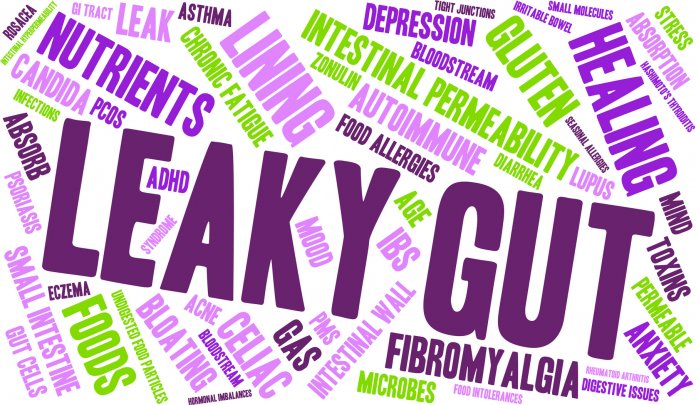Imagine for a moment that you have a nasty, open, bleeding scrape on your skin… ouch. What would you think if I told you to take a piece of pizza and apply it directly to your wound? Terrible idea, right? Dangerous even. Our bodies are not set up to absorb nutrients from food directly into our bloodstream like that… we are supposed to put it in our mouths and then let the digestive system extract the nutrients.
If your intestines are even the least bit inflamed, however, you may be giving your food more direct access to your bloodstream than you should. If you have “leaky gut syndrome,” tiny food particles make their way into the blood and get seen by the immune system in an abnormal fashion, similar to the “pizza on an open wound” scenario. This abnormal exposure can trigger immune reactions that can cause all sorts of problems throughout your body.
In the health and wellness community, we are starting to understand that the health of the gut and gastrointestinal (GI) tract confers major benefits to overall health, inside and outside of the GI tract itself. When your gut is healthy, it helps many other systems in your body work better, as well. This effect has to do with microbial balance, the bacterial “garden” in your gut. It also has to do with the health of the GI tract and the permeability of it.
The lining of the GI tract, from your mouth all the way down through your body, is a mucus membrane, a moist layer of cells coated in a thin layer of mucus. When we look at the cells that line the intestine through a microscope, we see that they are bound together with a structure that’s called a “tight junction.” It’s called a tight junction for a reason… it links the intestinal cells together, thereby forming the lining of the GI tract. When food passes through the GI tract and gets acted upon by acid in the stomach and the enzymes that the stomach, intestines, and pancreas produce, food gets broken down into tiny molecular parts. These molecules migrate into the cell itself, then pass through the opposite side of the cell into the blood so nutrients can nourish your body. In this way, nutrients make their way into the bloodstream only after passing through the cells.
Many factors related to modern living, such as a poor diet and an unhealthy lifestyle (excess alcohol, cigarette smoking, unmitigated stress, etc.), can cause tight junctions to loosen. Generally, this is the result of low-grade, “smoldering” inflammation inside of the intestinal lining, which can cause tight junctions to pull apart. When tight junctions open up, food molecules are able to pass in between cells — not through them like they are supposed to. This abnormal exposure can lead to a cascade of adverse reactions to foods. Just a few of these reactions include joint pain, brain fog, food intolerances, digestive disorders, depression, thyroid issues, inflammatory skin outbreaks, and autoimmune disorders.
If you have leaky gut, the first step to recovering is to make changes to your diet and your lifestyle. For example:
– Eat whole, nutritious foods. A plant-based diet focused on a rainbow of vegetables, fruits, legumes, healthy fats, and healthy proteins is paramount.
– Avoid processed foods. These can compromise the health of your gut, and the rest of your body.
– Reduce your exposure to “trigger foods.” Some foods are particularly dangerous to have leaking through your system if you have leaky gut. These include wheat, (and sources of gluten), dairy, corn, soy, and eggs.
– Exercise. Make sure you’re getting 30 minutes of moderate physical activity each day. Walking is ideal. Make it happen every day.
– Sleep well. Pay attention to your sleep patterns, and make sure you’re getting between seven and nine hours of quality sleep in a cool, dark room each night.
– De-Stress. Take steps to manage and reduce your stress. These steps can include meditation, yoga, journaling, or talking through problems with close friends (or all of the above).
Leaky gut is not something that should be ignored. If you suspect that you have this condition, make the above-listed lifestyle changes, and consult a health professional you trust for guidance in getting your intestinal lining back in shape.
– Dr. Joshua Levitt


